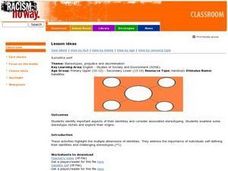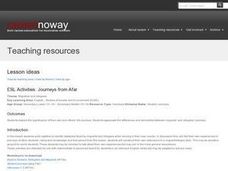Curated OER
Investigating Our Multicultural World
Students compare and contrast a perceived view of life in Australia with the reality. In groups, they identify examples of stereotypes and how they can lead to misconceptions about a group of people. In groups, they complete a...
Curated OER
Perceptions - Frame of Reference
Students understand that a person's perception or judgement of something or someone is greatly influenced by one's frame of reference including one's values, beliefs, experience and country.
Curated OER
Significant Events
Students identify significant events in Australia's history. They speculate how they have influenced the development of our culturally diverse nation. Students write an imaginary interview with a person whose life was influenced by one...
Curated OER
Perceptions - Difference
Students explore different perceptions and differences between people. They incorporate the themes of stereotypes, prejudice and discrimination. Students comprehend that people have different perceptions of the same phenomenon. They...
Curated OER
Satellite Self
Students identify important aspects of their identities and consider associated stereotyping. They examine some stereotype cliches and explore their origins.
They address the importance of individuals self-defining their identities and...
Curated OER
The United Nations
Students are introduced to the role of the United Nations. Using the internet, they research its history and its influence on politics and peace. In groups, they create a timeline of significant United Nations conventions since World...
Curated OER
Australian Settlers
Students interpret graphs and research events to identify links between events in the world and the arrival and plight of immigrant groups. They discuss the myths about immigration.
Curated OER
Focus on the Media
Learners critically examine news articles and editorials for attitudes of discrimination and prejudice. Students then complete checklist in which they analyze news reports for context, content, point of view, language, graphics, and...
Curated OER
Cultural Mapping
Young scholars are introduced to the cultural diversity in Australia. Using new vocabulary, they define multiculturalism and explore their own cultural backgrounds. In groups, they complete a series of worksheets to develop a better...
Curated OER
Australia's Religious Diversity
Students identify major world religions and forms of spirituality and recognise the religious diversity of communities in Australia. They brainstorm for the definition of religion. Students brainstorm to come up with a list of religions.
Curated OER
Pieces of the World
Young scholars locate Australia in relation to rest of world, read poem Pieces of the World by Mervyn James, explore kinds of journeys that Australians have made, and examine their effects - the emotions, the realities and the...
Curated OER
V-R-A-N-T-S-I-S and Me
Students discuss themes and issues of culture, identity and self-esteem. They construct responses to those themes. Students profile themselves and try to answer questions about themselves tied to the themes of this lesson.
Curated OER
Good Heavens
Students look at the history of science to identify some of the scientific ideas that different cultures have contributed to science throughout history. They describe using examples ideas developed by different cultures to explain the...
Curated OER
I am, you are, we are...
Students recognize that individual and groups have both common and different attributes and that each individual may be a member of many different groups. They choose a potato to paint a picture showing the character of their "friend"....
Curated OER
A Mixed Bag of Apples
Middle schoolers recognize that individuals and groups have both common and different attributes and that each individual may be a member of many different groups. They recognize, appreciate and value individual differences and...
Curated OER
Outside the In-Group
Learners pretend they are the person who is kept out of a group. As a class, they examine the behaviors of each person in a group situation and discuss how the role-play made them feel. They examine situations in which they kept...
Curated OER
Myth of the Western Man
Students identify ways in which history and culture influence identity. They make a time-line and research dates to identify their significance, as well as, create a self portrait pictorially or verbally, that explores the complexity of...
Curated OER
Fair Dinkum!
Students define fairenss, justice and equity as they are known to them. In groups, they role-play varoius scenerios and discuss their reactions to it. As a class, they share experiences in which they were treated unfairly and what could...
Curated OER
Reconciliation
Students develop an awareness of issues involved in Reconciliation. They use two different stimuli to approach this theme. Students write definitions/interpretations of Reconciliation.
Curated OER
Warlugulong
Learners explore and appreciate variety of ways in which environment can be depicted for range of purposes. They compare different representations of place and environment, and analyze ways information is being communicated.
Curated OER
United Nations International Declaration of Human Rights (1947) - 12 October 2000
Students use the 1947 Declaration of Human Rights to explore the concept of basic human rights in relation to past and present world situations. They brainstorm or think of cases where rights are being abused at school, in Australia or...
Curated OER
Blood Brothers
Learners study the blood characteristics of a number of distinct racial/ethnic groups. They build skills in observation, information gathering and processing. Students experiences strongly reflect the nature and intent of the current...
Curated OER
Journeys from Afar
Young scholars explore the significance of their own and other's life journeys. They appreciate the differences and similarities between migrants' and refugees' journeys. Students identify obstacles faced by migrants and refugees when...
Curated OER
Migration and Refugees
Students explore issues relating to refugees. Using the internet, they gather facts about refugees. Students discuss the range of situations which turn citizens of one country into refugees of another.

























